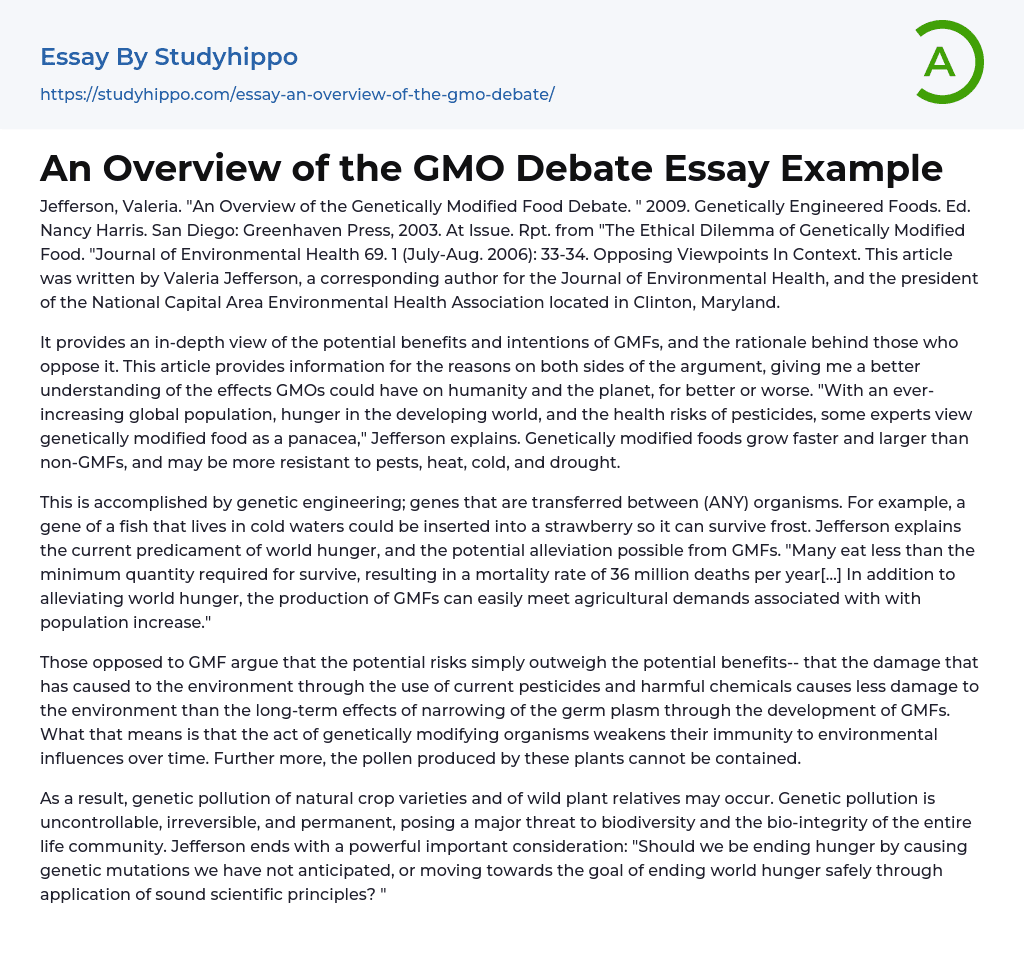Valeria Jefferson, the author of the article, is both a corresponding author for the Journal of Environmental Health and the president of the National Capital Area Environmental Health Association in Clinton, Maryland.
The article explores the benefits and reasons for genetically modified foods (GMFs), as well as the opposition they face. It presents information from both perspectives, aiding my understanding of GMOs' possible effects on people and the environment. According to Jefferson, certain experts regard genetically modified food as a solution due to factors such as rising global population, hunger in developing countries, and health hazards linked to pesticides. Genetically modified foods can grow faster and larger than non-GMFs, while also possessing enhanced resistance against pests, heat, cold, and drought.
Genetic engineering enables the transfer of genes between organisms, such
...as inserting a cold-water fish gene into a strawberry plant to make it frost-resistant. Jefferson highlights the issue of global hunger and proposes that genetically modified foods (GMFs) can help solve this problem. He emphasizes that insufficient food consumption leads to 36 million deaths annually[...]. Furthermore, in addition to tackling world hunger, GMFs can effectively meet growing agricultural demands caused by population growth.
Opponents of GMF claim that the advantages are outweighed by the risks. They contend that the harm caused to the environment from existing pesticides and toxic chemicals is smaller compared to the lasting impacts of reducing genetic diversity resulting from GMF advancement. To put it differently, modifying organisms genetically diminishes their resistance to environmental factors as time passes. Moreover, it is not feasible to control the spread of pollen produced by these plants.
The occurrence o
genetic pollution in natural crop varieties and wild plant relatives can lead to irreversible and permanent damage, presenting a significant danger to biodiversity and the overall ecological balance. Jefferson highlights the critical question of whether we should address hunger by risking unforeseen genetic mutations or strive to safely eliminate world hunger through the application of scientifically proven principles.
- Food Safety essays
- Food Security essays
- Beverages essays
- Cuisines essays
- Dairy essays
- Desserts essays
- Fast Food essays
- Bread essays
- Meal essays
- Meat essays
- Organic Food essays
- Rice essays
- Sugar essays
- Taste essays
- Beef essays
- Coconut essays
- Crowd essays
- Dinner essays
- Juice essays
- Sainsbury essays
- Cooking essays
- Ginger essays
- Oreo essays
- Drink essays
- Beer essays
- Wine essays
- Coffee essays
- Tea essays
- Cake essays
- Hamburger essays
- Ice Cream essays
- Burger essays
- Pizza essays
- Fruit essays
- Lemon essays
- Food Waste essays
- Favorite Food essays
- Alcoholic essays
- Soft Drinks essays
- Cookie essays
- Starch essays
- Yeast essays
- Cola essays
- Pizza Hut essays
- snack foods essays
- chips essays
- Biscuit essays
- Brewing essays
- Brewery essays
- Anorexia essays




